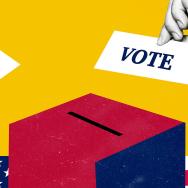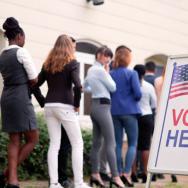As Chicago prepares to host the Democratic National Convention, the 2024 U.S. presidential race looks entirely different than it did a few short weeks ago.
Vice President Kamala Harris is now the Democratic candidate—with Minnesota Gov. Tim Walz as her running mate—after President Joe Biden made the unprecedented decision to drop out of the race, only a week after former President Donald Trump survived an assassination attempt.
Now, Democrats will gather in Chicago from Aug. 19-22, setting the stage for the final months of the election. Chicago has hosted the DNC several times, but the 1968 convention often sticks in popular and historical memory. Earlier that year, President Lyndon B. Johnson announced he would not seek reelection, requiring delegates to vote for a new nominee. Outside the convention, thousands of police and anti-Vietnam War protestors clashed violently, all televised for the world to see.
We spoke to Profs. Elisabeth Clemens, John Mark Hansen and William Howell, leading University of Chicago scholars, to get their thoughts on the significance of this political moment, comparisons to the 1968 convention and the issues that will shape the remainder of the election.
A lot has happened in the past few weeks. From your scholarly perspective, how are you thinking about this unique political moment?
Clemens: After years of focus on democratic erosion, the past few months have unsettled any confidence in predictions. The election results in India, for the European parliament, in France, in Britain, or in Venezuela provide evidence of both deep vulnerabilities and unexpected possibilities for democratic politics. In this context, I will watch for how the U.S. candidates are—or are not—able to persuade voters that it is worth voting.
Howell: Historically, there have been instances when an incumbent president withdrew during an election year, as in 1968. There have been previous assassination attempts on presidents, former presidents and candidates. There have been plenty of elections when uncertainty about a party’s nomination ran right through a brokered convention.
What we've been observing over the course of the last month is altogether exceptional: An incumbent president who secured all the delegates needed for the nomination but who withdrew from the campaign just weeks before the convention for reasons that have nothing to do with a political scandal or with a falling out with his party on the basis of policy issues—and a vice president emerging within hours as the new candidate. On split screen, meanwhile, you have Trump not just wielding, but flaunting his total control over the Republican Party, which was only enhanced through this recent assassination attempt; and then him selecting, if not a facsimile, then certainly a loyal servant as his vice president.
All of this has happened in a matter of weeks. Have we seen some of the elements of this drama before? Sure. Have we seen them strung together in the way that we have this last month? Not even close.
Hansen: In my election analysis, I tend to emphasize the “fundamentals”—partisanship, state of the economy, war and peace, positioning on issues—over the particulars of the candidates. The fundamentals work because they prioritize historical experience and discount idiosyncrasies. But we’ve never had so many idiosyncrasies.
It’s difficult not to compare this DNC to the one held in Chicago in 1968. What are a few key parallels and differences between them?
Hansen: Some people seem to fixate on the comparison out of hope and some out of fear, but I don’t think the parallels are so great. In 1968, two national leaders were assassinated (King and Kennedy), there were riots in cities large and small (including Chicago), U.S. soldiers were fighting in Vietnam, and the movement against the war was vastly larger than anything we’ve seen this year. Chicago was controlled by a machine. The Democratic Party was deeply split over the war, and George Wallace was running an independent campaign to reverse the progress in civil rights. There are deep social cleavages now, but they are between the parties rather than within the parties.
Howell: After Biden stepped down, there was a brief moment where we might have seen something like the ‘68 convention—if a stalwart of the liberal wing of the Democratic Party had stepped forward to contest Harris, and if a divided party had sought to reconcile its differences in a brokered convention. But that moment vanished almost instantly. The party fell in line behind Harris. And despite lingering cleavages—particularly over the war in Gaza—the party appears entirely unified in its support for Harris.
Moreover, this convention is coming on the heels of a sustained period of social, racial and political tumult, as occurred in ‘68. And let us also note that Chicago's mayor today looks very different from the Mayor Daley from ‘68. It’s inconceivable that Mayor Johnson will encourage the police force to crack down on protesters, as Daley did. On the whole, then, it’s hard to see how this year’s convention looks anything like the division, upheaval and violence that defined the one in 1968.
How do you view the role of protest during national conventions?
Clemens: In contrast to 1968, conventions are now—literally—fenced about in ways that contain protest while lowering its visibility given the distance of the approved protest sites from media personnel. Instead, the challenge will be to find ways to acknowledge the deep concerns and grievances that motivate protest. Whether centered on Gaza or racial justice, those acknowledgements must be heard as significant and authentic without alienating other constituencies in the party. This, perhaps, is the most treacherous minefield for the convention.
How do you think the change from Biden to Harris will affect voters who had planned to sit out of this race? How do you think it’ll affect younger voters?
Clemens: If the polls are accurate, this remains a tight race. One way to influence a tight race is to change minds, to focus on swing voters. But the other is to think about turnout. On this score, the change to a Harris/Walz ticket may well have important consequences for at least two reasons.
The first turns on affect, or emotion. Depression and anxiety are demobilizing. The sour tone and despondency of the spring and early summer signaled an important weakness for the Democrats. But joy—as well as the sense that victory is possible and the desire to be on the winning side—mobilizes.
A second impact may follow the sharpening of focus on reproductive rights. Harris has taken the lead in making the case after Dobbs while Walz speaks powerfully of his personal commitment to IVF. This shift aligns with the networks and infrastructures of mobilization built through signature gathering and voting on state ballot issues. In many cases, these efforts have been surprisingly successful. But even where defeated, the prior experience of canvassing and signing and voting primes the electorate—and younger voters in particular—to be receptive to the new ticket.
Howell: It wasn’t some spasm of misguided anxiety that led the Democratic Party to impulsively boot their front-runner from the race; it was done with real cause. President Biden’s debate performance in June spoke to lingering, deep, and abiding concerns about his age and his ability to perform the duties of office. Would Biden have ended up winning in November? Probably not, but we don’t really know. Will Kamala Harris necessarily win by virtue of this shift? We’ll have to wait and see.
How will this change of guard affect younger voters? The early signs look good for Harris, who is attracting a level of support—enthusiasm even—that eluded Biden. And given that her policy positions, by and large, mirror Biden’s, it’s hard not to ascribe this newfound energy to Harris’s own biography, the unique skills she brings to the ticket, and, not least, the fact that she is decades younger than the opposition.
What are the key issues that you think have the opportunity to sway voters during the remaining months of the campaign?
Clemens: In addition to reproductive rights and the tragically complex conflict between Palestinians and Israel, I expect voters to be attuned to the arguments that are made about the economy. The baseline progressive case has been redistributive, captured in the slogan of the “99%." But Harris has given early signals that she will reorient the discussion toward the excessive market power of corporations while Walz is quite eloquent in speaking to those middle-income voters who strain to meet the costs of housing, childcare and health care.
Hansen: The Republicans are going to try to keep the focus on immigration, the Democrats on abortion and, more broadly, individual freedom. In the swing states, which were also the swing states in 2020, I think we’re likely to see the Democrats frame Trump’s election denialism and January 6 in personal terms: He tried to throw out your vote.
Howell: I don’t think there is any great mystery here. The economy will loom large. It always does in presidential elections. Meanwhile, the Republican Party will try to make the most of immigration, which they see as playing to their political advantage; and Democrats will emphasize abortion rights, which they see as playing to theirs.
I’m interested to see how Harris speaks to persistent concerns about democracy. Early indications suggest that they are not going to be featured prominently in her campaign. From a purely electoral standpoint, this may be the right move. But if we are going to put our democracy on more stable footing, we need to see some genuine leadership from the top that sets an agenda for meaningful reform.
—Parts of this story first appeared on UChicago’s Harris School of Public Policy website.

